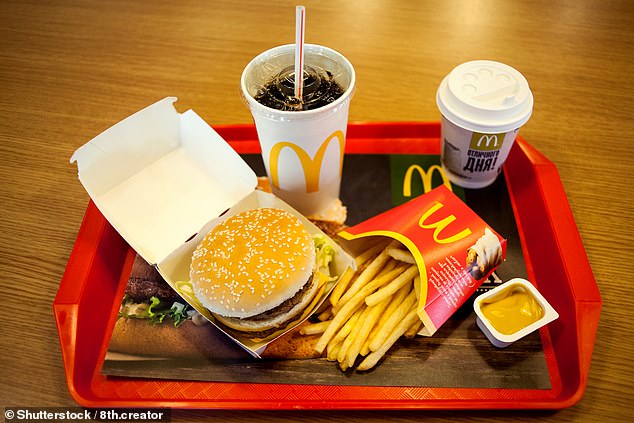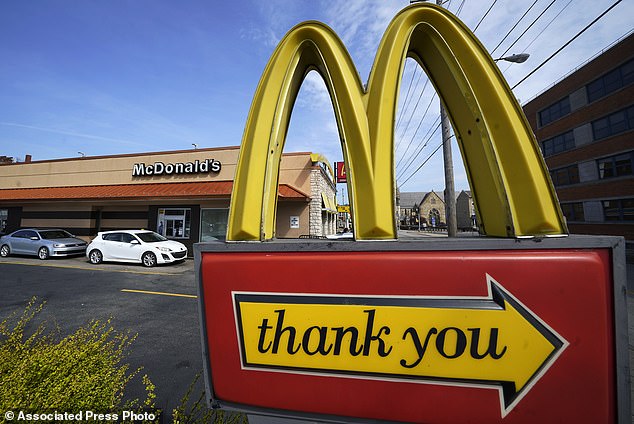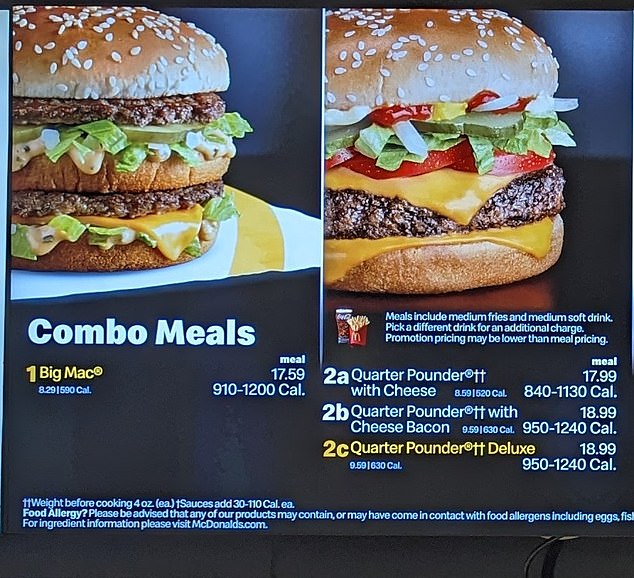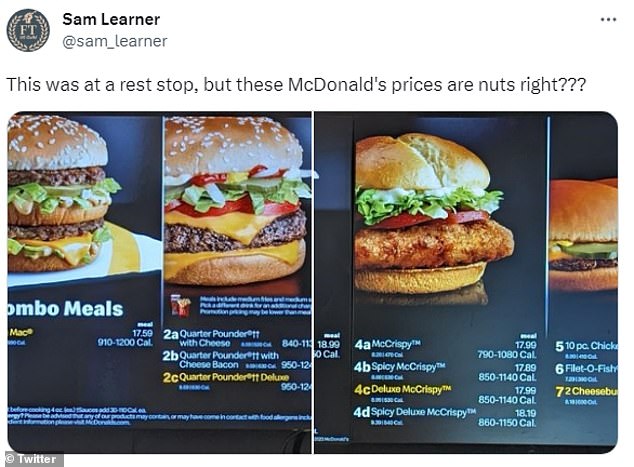McDonald’s revenue soars by 14% after hiking menu prices – up to $18 for a Big Mac combo meal
It was mixed news for McDonald’s in terms of third-quarter sales, as profits rose, but rising prices meant a drop in customers, which may see them taking the breaks for further increases.
McDonald’s sales rose 14 percent to $6.69 billion, ahead of Wall Street’s forecast of $6.56 billion. Net profit – including a $26 million charge for a restructuring announced last spring – rose 17 percent to $2.3 billion.
The Chicago-based company earned $3.17 per share for the quarter, also beating expectations of $3.00. Shares rose 1 percent on Monday.
McDonald’s said U.S. traffic fell slightly in the third quarter as fewer visits came from customers with annual incomes of $45,000 or less.
But the price increases have weighed on customers, including one location in Connecticut that offered a Big Mac combo for up to $18.

A McDonald’s restaurant in Connecticut offered a Big Mac combo for $18
McDonald’s said it is curbing higher prices and focusing more on value meals after a drop in visits from some customers.
The hamburger giant reported better-than-expected third-quarter sales on Monday. Global same-store sales (or sales at locations open for at least a year) rose 8.8 percent in the July-September period.
That was higher than Wall Street’s forecast of an 8 percent increase, according to analysts polled by FactSet.
McDonald’s was accused of ‘greedflation’: the practice of cashing in on headlines about inflation by raising prices more than necessary.
In the first three months of 2023, McDonald’s saw its profits skyrocket to $3.314 billion, an increase of 8.64 percent from the same period last year. About 8.4 percent of the growth was attributed to higher menu prices.
According to the The Economist’s Big Mac IndexSince 1996, the price of McDonald’s food has increased by 125 percent.
And in the last two years alone, it’s up 6 percent.
Chief Financial Officer Ian Borden said the company did raise U.S. prices in the third quarter, but at a slower pace.

The outlet in question is located at a gas station on I-94, Darien, Connecticut

An exit sign is displayed at a McDonald’s restaurant in Pittsburgh
McDonald’s expects U.S. prices to rise just over 10 percent for the year, he said.
“Inflation is starting to come down and we expect prices to come down,” Borden said on a conference call with investors.
But the company also plans to focus on deals. This month it launched “Free Fries Friday,” where U.S. customers get free medium fries every Friday through the end of the year if they spend at least $1.
These types of deals have resonated in Europe, where customer spending is under even more pressure this year.
The McSmart menu, which launched in Germany earlier this year, allows customers to create their own small meals.
CEO Chris Kempczinski said the deal helped Germany achieve its tenth consecutive quarter of double-digit sales growth in the July-September period.
In the United Kingdom, the company offered discounts throughout August, including 60 percent off Big Macs and Chicken McNuggets. And in China, where consumer confidence is at an all-time low, McDonald’s launched small hamburger bundles.
But Kempczinski said customers’ value perceptions go beyond price. The company’s newer stores and faster service times should also remain a draw.

The average price of the meal – including fries and a drink – is $8.64 in the US, according to MC-Menu.

A restaurant was surprised to find that a McDonald’s chain in Connecticut was charging $17.99 for a Big Mac meal
“We are focused on maintaining our value leadership and we are going to do what we need to do to maintain our value leadership. But I think we also have a lot of things that are valuable,” he said.
Kempczinski criticized a rule released last week by the National Labor Relations Board that could classify McDonald’s and other fast-food giants as “joint employers” of workers in franchised restaurants because they set work rules, wages and benefits.
Ninety-five percent of McDonald’s U.S. restaurants are owned and operated by franchisees.
The rule could make it easier for workers to unionize because they would be able to bargain with McDonald’s instead of with individual franchisees.
Kempczinski said the new rule, which takes effect Dec. 26, will hurt small business owners. He expects the rule will be challenged in courts and in Congress.
“In our view, this is yet another example of the overreach of the agencies coming out of DC,” he said.
